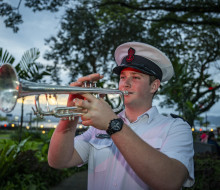
Taupō trumpeter in demand in brand new career with Royal New Zealand Navy Band
26 August 2025
Unfortunately you are viewing this website on an outdated browser which does not support the necessary features for us to provide an adequate experience. Please switch to a modern browser such as latest version of Google Chrome, Mozilla Firefox, Apple Safari or Microsoft Edge.
Ngā mihi nui
“Are you the person who’s replacing that woman who’s been there since the Land Wars?” That was among the greetings Carolyn Carr received when she started her job as the deputy to the Ministry of Defence chief librarian in 1983.
Now, 40 years later, Dr Carr has retired as NZDF chief librarian “and people are probably thinking the same about me”, she joked at her Trentham farewell function.
Carolyn grew up in Blenheim and studied at the University of Canterbury and the New Zealand Library School before moving to Wellington, where she was asked to take up the Defence library job.
Early on she was warned not to repeat a mistake made by chief librarian Ngaere Reeves, who was “a force to be reckoned with”.
“When getting to grips with signals, Mrs Reeves once sent a message to the NZ Army battalion based in Singapore. The ‘flash’ classification on signals was only meant to be used in extreme emergencies, such as war.
“She used it because she was chasing an overdue library book. She put the library on the map!”
During Carolyn’s career the NZDF library moved four times, survived earthquakes and flooding, and embraced computerisation.
“In my working life in the NZDF I have survived more restructures than I care to remember.
“It’s no mean feat moving 30,000 books.
She and her team have endured two disasters; the 2016 earthquake and the Stout Street flood of 2001, when an overflowing bathroom on the sixth floor cascaded down to the ground-floor library.
“Fortunately we had a Disaster Plan and the foresight to have tarpaulins on standby which saved the magazine collection – thanks to the quick action of the security staff.”
When she started libraries were mostly paper-based with card catalogues in large filing cabinets.
She recounted her initial encounter with the library’s first computer.
“You had to sign for a key to go and interview this thing. I plucked up courage… and went into the room. I had no idea how to turn it on never mind do anything with it.
“I spent a lot of time just looking at it. If I touched it would I break it? I sat down for a bit… and then I left. I never even fired it up.
“One of my staff said ‘one day we’ll all have one of these on our desk’ and I thought ‘not in my lifetime. Now I carry one in my handbag’.”
While the library collection continues to include military and defence studies, computerisation was the biggest change she had seen.
Carolyn said she had always had talented people working around her and she would miss them, both military and civilian, and the extraordinary librarians.
She admitted she had a bias towards Army (while of course acknowledging the other two services) due to her family history and her relationships with its leaders. In particular, in the last two years Colonel Martin Dransfield, Major Jim Maguire and Dee O’Connor have been instrumental in securing accommodation in Trentham Camp in which to unpack the collection, which has been in storage since the 2016 Kaikoura Earthquake. There have been many other colleagues and supporters, too many to name.
She was pleased the library was now at Trentham, where it could be unpacked and used by NZDF personnel.
“Our library service is for personnel, both military and civilian including military families, to support their work, their study and recreational reading. It serves all those functions.” In addition, it is a national taonga for military and defence historians, researchers, students and members of the public.
In retirement, Carolyn isn’t planning to slow down and travel to Europe and visiting the Liberation Museum – Te Arawhata, at Le Quesnoy in France, is high on the agenda. She also wants to contribute to her community by expanding on the mahi in which she is already involved.
“Like any good librarian I’ve got a list.”
In her conclusion she said it had been a privilege to be part of the New Zealand Defence Force. She wished her management and many colleagues and friends in the Defence Shared Services Group and the wider NZDF whānau success in the future; which she would continue to follow with interest.